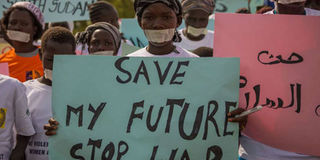Be a sister’s keeper and end South Sudan war

Women carry placards as they march through the city to express the frustration and suffering that women and children face in Juba, South Sudan, on December 9, 2017. PHOTO | TEFANIE GLINSKI | AFP
What you need to know:
- There is a need for concerted action by the African Union and the United Nations against the leadership in Juba.
- It is in the self-interest of the countries within the region to be part of the solution to the war in South Sudan.
The biblical Cain, having murdered his brother Abel, was sauntering away with blood dripping from his hands when his God thundered from Heaven, asking him the whereabouts of his brother Abel. He sneeringly responded: “Am I my brother’s keeper?”
Cain’s attitude of impunity is reflected in the conduct of the drivers of the war they are waging right in our backyard in the nascent South Sudan at great cost to unarmed civilians.
Whereas the civilians’ lives have been disrupted by the war, the warlords continue to lead lives of relative ease, facilitated by the neighbouring countries.
It is common to see these makers of war comfortable in the high-end residential areas of their host countries.
In contrast to this opulent lifestyle, the citizens face a bleak existence devoid of the basic necessities that guarantee a dignified life.
PEACE TALKS
Regional and international actors have provided a platform for peace talks.
Most recently, the Inter-Governmental Authority on Development (Igad) reconvened the High Level Revitalisation Forum aimed at facilitating dialogue that would chart the path to the end of a debilitating civil war and, hopefully, make possible the reconstruction of South Sudan.
They have received no support from the key actors of the conflict, however, and it is telling that the Cessation of Hostilities Agreement signed in December notwithstanding, the war has continued unabated.
But what fuels this war? How is it that such a war is condoned within a region that has an intimate ecosystem where the impact of a dysfunctional economy is likely to be felt?
REFUGEES
Already, each one of the neighbouring countries has had to play host to large numbers of refugees displaced by the war.
Again, the high volumes of illicit financial flows from South Sudan present a risk to their economies.
Further, private entrepreneurs have suffered great losses and those who continue to ply their trade in South Sudan do so at great risk to their lives and businesses.
It is, clearly, in the self-interest of the countries within the region to be part of the solution to the war in South Sudan.
The Women’s Virtual Summit on South Sudan, being held today to commemorate Africa Day, provides an opportunity to reignite the spirit of solidarity that supported the liberation struggle in the continent.
SANCTIONS
Through the leadership of former Liberian president Ellen Johnson Sirleaf, we have witnessed the role that women can play in providing leadership in post-conflict countries.
We owe it to the women of South Sudan to rally with them and support them as they endeavour to set-up the infrastructure of peace.
There is a need for concerted action — such as sanctions and embargoes — by the African Union (AU) and the United Nations against the leadership in Juba, which has normalised brutality and violence against innocent South Sudanese.
Neighbouring countries must also ensure that illegally obtained wealth is not channelled through their countries and then used to finance the war in South Sudan.
JUSTICE
We must act to ensure protection of civilians from the harmful effects of the conflict.
That means the AU must move with haste to establish the hybrid court so that there is accountability for the atrocities committed against civilians.
Most importantly, women should be supported to be agents of change in South Sudan.
This is a significant year for the people of South Sudan: In July, they will be marking the seventh anniversary of independence. The number ‘7’ symbolises completeness.
Let us support the people of South Sudan at the SawaSouthSudan Summit so that come July 9, 2018, they are able to truly celebrate Independence Day.
Ms Mong'are is the Federation of Women Lawyers (Fida-Kenya) chairperson; [email protected]



